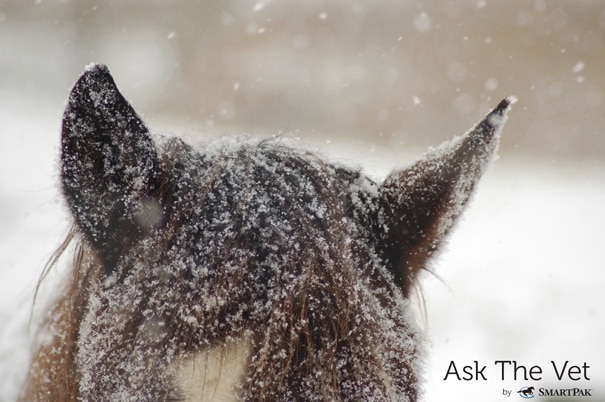Feeding Your Horse Supplements Year-Round - Tips for Winter

My show horse gets a joint supplement, an electrolyte supplement, Omega Horseshine and SmartHoof Pellets. A few people in my barn mentioned that they stop feeding supplements once show season is over, and I’m wondering if that is recommended. I won’t be riding as much over the fall and winter and I’m really confused about what I should do regarding his supplements. Thank you! LH, Vermont
Dear LH,
Actually what’s recommended in the winter is the same as what’s recommended in the summer. Provide your horse a complete and balanced forage-based diet, with or without grain depending on his energy requirements, and address any individual issues he may have with appropriate supplements. For riders that keep training and competing all year long on a winter show circuit, very little may change about their horse’s supplement requirements. However since your horse will be in less work over the winter, take this opportunity to re-evaluate his diet and figure out if he needs the same, less or even more nutritional support.
If winter means the end of pasture grazing for your horse, then he may not be getting the minimum recommended amounts of certain nutrients—like Vitamin A, Vitamin E and Omega 3 fatty acids—from his hay alone. Also, if less work also means you’ll be feeding him less grain, then he’ll be getting less vitamins, minerals and protein as well. If either of these situations is true in your case, your horse may need a Joint Supplement
A joint supplement is a sound investment for an active horse, and while you may be able to get by with a smaller dose or less aggressive formula once show season is over, I hesitate to recommend completely stopping for a few months. One reason is that, while your horse’s joints may undergo less stress because you’re not riding and training as much, his joints will still be subject to ongoing, daily wear and tear. Also, completely stopping a joint supplement means that when you start it up again, you may have to use a loading dose to build the levels of key ingredients back up in your horse’s body. For about the same amount of money, you may as well continue the maintenance dose through the winter and keep the levels of Glucosamine, Chondroitin sulfate, HA, MSM and other ingredients in the therapeutic range.
Electrolytes
Turning to electrolytes, you’re probably supplementing them in the summer to replace the salt and other minerals that are lost in sweat. In the winter, electrolytes are recommended to stimulate drinking and keep horses hydrated in the hopes of avoiding colic. I personally provide electrolytes year-round to my horse.
Skin & Coat Supplement
Next is your skin and coat supplement, Omega Horseshine. My guess is you feed this during show season for a winning “show ring” shine. But because of its flax seed base and high Omega 3 fatty acid content, this product is doing just as much good on the inside of your horse as the outside. A supplement with the inflammation-fighting Omega 3 fatty acids is one I would be adding at the end of grazing season, not removing.
Hoof SupplementFinally, you list a hoof supplement, SmartHoof Pellets. Obviously you’re feeding Biotin, Methionine, Zinc and other components for a reason. Maybe your horse has cracks or chips easily. Maybe he doesn’t hold shoes well or has thin walls. Unfortunately, these issues are not going to get any better with rest or the slower hoof growth rate that is seen in the winter. And, just like with the joint supplement, if you stop providing the building blocks of healthy feet for a few months, you will just have to spend more time and more money replenishing their levels in the body when you decide to add them back in.
My advice is to carefully consider why you put your horse on these particular supplements in the first place and determine if the issues you are trying to address “go away” during the winter just because you ride and show less. Some do, some don’t. The bottom line is that the purpose of supplements is just that, to supplement your horse’s regular diet in those areas where he needs additional support. What may seem like a good idea now as things are winding down may create unnecessary challenges for you and your horse next spring as you gear up for another season of riding and showing.